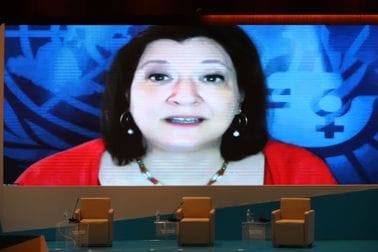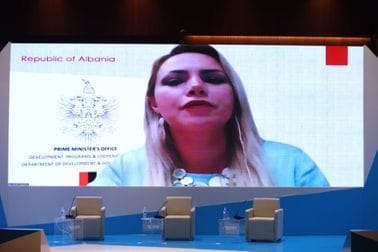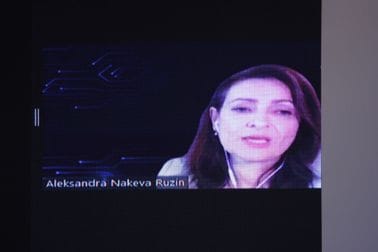- Government of Montenegro
Srzentić: We want to head in the right direction a...
Srzentić: We want to head in the right direction and we need strong foundations thereof

Minister of Public Administration, Digital Society and Media Tamara Srzentić emphasized that the citizens of Montenegro deserve a Government that meets their needs in everyday life.
“People in Montenegro want a fast digital transformation. We want to head in the right direction, and this will be contingent upon a strong foundation. In addition to the Digital Strategy, we must dedicate ourselves to capacity building in the Government and provide training to civil servants,“ Srzentić said.
She pointed out that digital transformation requires specific skills, but what is more important is that it seeks conditions that enable innovation and models that enable the use of new methods and ways of addressing the problems, in order for citizens to acquire greater benefits.
“This requires a multidisciplinary approach of a team that cooperates and that uses a culture of experimentation. There isn’t a completed process. We should always get feedback from end users and then improve systems thereof. The idea is that, after the Summit, our team makes a retrospective of what we have learned, what we want to change. So we need modern leadership, where leaders are there to provide training to team members,“ said Sezentić.
The Minister of Trade, Tourism and Telecommunications of Serbia, Tatjana Matić, emphasized that digitalization is one of the priorities of this Ministry and the Government of Serbia aims at developing a broadband infrastructure as a basis for the development of modern society and the use of digital services.
“We are working further on the development of a broadband network in order to overcome the digital gap between urban and rural areas in Serbia and to enable Internet access to all households in Serbia by 2025. The wireless local area network has been installed in over 800 schools throughout Serbia, and the objective is to cover all schools. Today, it is possible to access the broadband network from over 1,600 schools throughout Serbia, and in the forthcoming period it will be available to a larger number of institutions. In this way, over 60 percent of students in Serbia already have access to the Internet in a secure environment, and that is the case with students in the academic environment, “ said Matić.
According to her, Serbia was the first in the region to adopt the Strategy for the Development of Digital Skills for the period from 2022 to 2024.
The National Coordinator of the National Platform for Digital Learning of the Ministry of Education and Science in Republic of North Macedonia, Aleksandra Ruzin, said that the key role that education systems can play in the digital transformation of economies is clear.
“For a very long time, there has been a perception of limited potential in the use of digital technologies in education, and this has changed abruptly with the coronavirus pandemic, because the educational process could only continue with the use of digital technologies. The use of digital infrastructure does not in itself guarantee that these funds will be used in schools in a pedagogically correct manner, “ said Ruzin.
She explained that the new technology does not create education, but teachers are the ones who should be qualified to use that technology, as a tool for transferring knowledge and competencies.
“Digital competence is one of the key factors to bring the education system in line with the needs of the 21st century. It is necessary to ensure that the digital skills of professors are upgraded in order to catch up with the progress that is evident in the field of IT technologies”, said Ruzin.
The Director General of the Development Programs and Cooperation Department in the Office of the Prime Minister of Albania, Florence Haxhi, reminded that the COVID-19 crisis has led to changes in the way people work, live, resulting in the redefinition of habits, industries and has led to some innovative business models.
“Post- Covid reality requires a new way of thinking at the Government level based on open exchange of knowledge and information for the introduction of innovative policies and measures, in order to increasingly involve various actors, such as the private sector and the academic community. We need to find a way to involve them more in our daily work, to prepare better policies, because policies are created for them. Thus, we have to work closely together and find that mechanism, ”Haxhi said.
The Regional Director for Europe and Central Asia, UN Women, Alia El-Yassir, pointed out that technology opens up new possibilities in the world, but the reality is that many women, globally and regionally, are excluded from all this.
“We see a lack of investment in enabling women to have access to technology. The jobs of the future will be driven by innovation and technology, but how can women be competitive, if they cannot access the Internet at all? We need a gender-responsive education that will give everyone equal access to digital technologies. People must come first and the specific needs of different groups and all their differences must be taken into account and we must ensure that we move from words to deeds,”said El-Yassir.
Gallery
![gallery.media[0].alt](https://media.gov.me/media/gov/2021/10/11/1633949443r9kza34qapobp2ws.jpg?cacheControl=1633967375)




